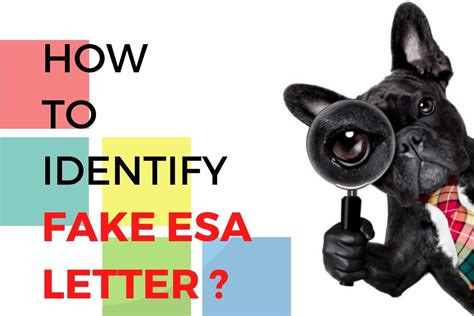Understanding the Importance of an ESA Letter
An Emotional Support Animal (ESA) provides therapeutic benefits and support for individuals with mental health conditions. An ESA letter is an official document issued by a licensed mental health professional that verifies the need for an ESA.

Spotting Fake ESA Letters
With the rising demand for ESAs, fraudulent ESA letters have become more common. These fake letters can have serious consequences, including fines and eviction. Here are some key indicators of a fake ESA letter:
- Unlicensed or Uncredentialed Provider: The letter must be issued by a licensed mental health professional, such as a psychiatrist, psychologist, or licensed clinical social worker.
- Generic Language: Fake letters often use vague or generic language that does not address your specific needs or diagnosis.
- Lack of Details: Legitimate ESA letters include detailed information about your mental health condition, the benefits of an ESA, and the duration of the letter’s validity.
- Unprofessional Format: Fake letters may have poor formatting, grammatical errors, or an unprofessional appearance.
- Non-Customized: Legitimate ESA letters are tailored to your individual needs and circumstances. A generic letter that appears to be identical to others is likely fake.
Reporting Fake ESA Letters
If you suspect a fake ESA letter, you can report it to the appropriate authorities. Here are the steps to take:
- Contact Your Housing Provider: Inform your landlord or property manager about the suspected fraud. They may have policies in place to address fake ESA letters.
- File a Complaint with the Licensure Board: Report the fraudulent provider to the state licensing board that oversees mental health professionals.
- Contact Law Enforcement: If the fraud involves a criminal matter, such as forgery or fraud, you can file a report with your local law enforcement agency.
Legal Consequences of Fake ESA Letters
Using a fake ESA letter can result in serious legal consequences:
- Fines: Some states have laws that impose fines on individuals who use fake ESA letters.
- Eviction: Landlords have the right to evict tenants who have fraudulent ESA letters.
- Criminal Charges: In some cases, forging or using a fake ESA letter may constitute a criminal offense.
Protecting Yourself from Fraud
To avoid becoming a victim of ESA letter fraud, take the following precautions:
- Verify the Provider: Ensure that the provider who issues the ESA letter is licensed and credentialed in your state.
- Review the Letter Carefully: Carefully examine the ESA letter to ensure that it meets the criteria mentioned above and does not contain any suspicious indicators.
- Keep a Record: Maintain copies of your ESA letter and any communication with the provider.
Alternatives to Fake ESA Letters
If you are considering obtaining an ESA, explore legitimate options instead of resorting to fraud. Here are some alternatives:
- Talk to a Mental Health Professional: Discuss your need for an ESA with a licensed mental health professional. They can assess your condition and provide guidance on obtaining a legitimate ESA letter.
- Check with Your Housing Provider: Some landlords may have their own policies or programs that allow for ESAs. Inquire with your housing provider to learn more.
- Consider a Service Animal: If your disability qualifies you for a service animal, pursue this option instead. Service animals have additional rights and protections under the law.
Conclusion
Fake ESA letters undermine the integrity of the ESA system and can lead to serious consequences. By being aware of the signs of fraud and taking necessary precautions, you can protect yourself from falling prey to scams and support the legitimate use of ESAs for individuals with genuine mental health needs.
